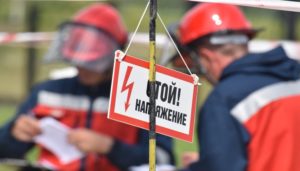Construction
6 common electrical safety issues on construction sites
Workers on construction sites have a lot of safety issues to consider, but one that can often go overlooked is that of electrical safety. Every year there are around 1,000 accidents at work related to electricity – and around 30 of these are fatal. This shows just how important it is to take electricity seriously.
 Here we take a look at six common electrical safety issues that could become a problem for you on a construction site. Understanding these issues can help to keep you and those around safe against potential injuries related to electricity.
Here we take a look at six common electrical safety issues that could become a problem for you on a construction site. Understanding these issues can help to keep you and those around safe against potential injuries related to electricity.
- Inadequate PPE
It is important to think of personal protection equipment (PPE) as a final line of defence when it comes to electrical safety, rather than something that you rely on to keep you safe on site. However, it is still the case that it is essential that construction site workers should be using adequate PPE to protect them in the event of coming into contact with live electrical currents.
Employers are responsible for providing the correct level of PPE to staff – it is never up to employees to buy the equipment that they need to stay safe. There are many types of PPE that you could benefit from around electricity; this could include insulating gloves, a face shield or safety glasses, insulating boots, and a flesh protection kit.
- Lack of adequate training
Another major issue is that is often an unspoken problem on construction sites is a lack of adequate training for staff. When it comes to electrical safety, it is absolutely essential that staff feel confident in what they are doing and having the right training will do this. It can sensible to talk to your employer if you are concerned about the lack of applicable skills to electricity on the site.
You need to ensure that you are using a training provider that is going to give you not only the knowledge but also a recognised qualification. “We let our credentials speak for themselves,” says Christos Panayiotou, Director at Trade Skills 4U “accreditations and memberships from organisations like City & Guilds and NICEIC tell customers so much more about our business than we could”.
- Incorrect testing
 It is absolutely essential that proper testing is carried out at a construction site. There is such a danger that workers will come into contact with live current during their tasks. This makes it important to place high quality electrical testing as a priority.
It is absolutely essential that proper testing is carried out at a construction site. There is such a danger that workers will come into contact with live current during their tasks. This makes it important to place high quality electrical testing as a priority.
This involves not only having the necessary personnel onsite to conduct the testing, but also making available the kind of equipment that is required. This could include everything from voltage detectors and clamp meters to receptacle testers.
- Not taking precautions
It is unfortunately the case that the majority of electrical safety issues could be avoided. Whether it comes down to human error or a failing with a piece of electrical equipment, the fact is that if correct precautions were taken, these issues could have been easily prevented.
It is important that you take all of the necessary precautions such as staying aware of the presence of electrical wires, and ensuring that the site has been inspected regularly by a qualified electrical engineer.
- Failure to carry out risk assessments
It is vital that those in charge of the construction site carry out extensive risk assessments for all aspects of safety – however, it is especially important for any issue surrounding electricity. These risk assessments should be carried out before work is carried out at the site.
Risk assessments are important for identifying electrical hazards and making sure that there is a plan in place to mitigate the risk. If you are concerned that there are elements of risk that have not been addressed it is important to bring this up with a manager or employer as soon as possible.
- Lack of understanding of signs
It is important that electrical safety signs are put as these can warn stuff about potential dangers while they work on the site. However, it is also vital to point out that members of staff must have a good understand of what the electrical safety signs mean so that they are able to make use of them.
Ensure that training has been provided to any workers about what each sign means and what actions they need to take when they see them.
6 common electrical safety issues on construction sites
Workers on construction sites have a lot of safety issues to consider, but one that can often go overlooked is that of electrical safety. Every year there are around 1,000 accidents at work related to electricity – and around 30 of these are fatal. This shows just how important it is to take electricity seriously.
Dakota Murphey
SHP - Health and Safety News, Legislation, PPE, CPD and Resources Related Topics
Workers facing uncertain future coupled with health and safety risks, new IOSH report says
Legionella Management: Who can be appointed as RP, DRP, AP or CP?
James Macpherson on risk: ‘More of the same won’t work’



whats a flesh protection kit